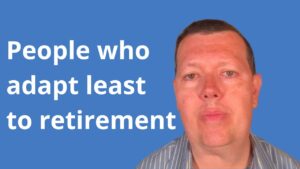
Retirement is not always synonymous with rest and freedom. For some people, this life change can even represent a real upheaval.
In this article, I explain why some people struggle more to adapt to retirement — and how to prepare for it better.
Identity: a key factor in the transition from working life to retirement
Are you afraid of getting bored after retirement? Do you dread the emptiness left by your career? You are not alone. What you feel is completely normal — and there are concrete ways to prepare for it.
To fully understand the difficulties of adaptation, we first need to talk about a fundamental concept: identity.
Each of us has two essential dimensions of identity:
- A personal identity: it includes our first name, culture, language, social or geographical belonging.
- A professional identity: it is linked to our job, our status, our role in the world of work.
For decades, our professional identity can take a central place in our lives. It is often through our job that we define ourselves, find recognition, status, and social usefulness.
Who struggles the most to adapt?
The people who experience the greatest difficulties in retirement are those whose identity is strongly centered on work. This often includes:
- Executives and leaders deeply invested in their role.
- Passionate professionals who have built their entire life around their job.
- Those who have few interests outside of work.
For these people, stopping work means losing a part of themselves. The lack of reference points can cause a loss of meaning, a feeling of emptiness, and even deep distress.
Jean, a former senior executive, experienced a profound sense of uselessness in the months following his departure. He had never imagined life outside of work.
Who adapts the most easily?
The people who go through this transition best are those who, even before retirement, have cultivated:
- Multiple roles in their life: parent, volunteer, artist, athlete, etc.
- Varied interests: travel, learning, manual or cultural activities.
- Solid social relationships outside of work.
By contrast, Marie, a teacher passionate about gardening and choral singing, experienced retirement as a liberation: she simply expanded the activities she was already enjoying.
They don’t base their entire identity on their career. Their life does not stop with retirement: it continues, sometimes with even more freedom and intensity.
How to prepare better?
The good news is that it is possible to anticipate and build a fulfilling retirement, even if you strongly identify with your professional role. Here are some concrete steps:
- Start exploring other areas beyond work: hobbies, volunteering, learning new skills.
- Imagine a post-retirement life project: what do you want to learn, create, or pass on?
- Identify the people you want to share this new phase of life with.
- Create a clear vision of your retirement, not as an end, but as a transition to a new form of activity and contribution.
A short exercise to reflect on your retirement:
Take a sheet of paper and list:
- What defines you today outside of work.
- The activities you would like to try or take up again.
- The people you would like to spend more time with.
This simple exercise can already change the way you see retirement.
Prepare for your retirement with personalized support
Do you want to experience a fulfilling retirement, aligned with your values and aspirations? Whether you are an individual or an organization, I offer tailor-made support to help you succeed in this important transition.
Prepare for your retirement with personalized support
Do you want to experience a fulfilling retirement, aligned with your values and aspirations? Whether you are an individual or an organization, I offer tailor-made guidance to help you succeed in this important transition.
Individual sessions – Group training – Practical and caring tools
Request an initial consultationFrequently Asked Questions about Adapting to Retirement
Who really needs retirement coaching?
Coaching is useful for anyone who feels anxious about this transition or struggles to picture a new life after work. It is particularly relevant for those whose identity is strongly tied to their profession.
When is the best time to start preparing?
Ideally: 1 to 2 years before retirement. This gives you time to explore other interests and build a coherent life project.
Is it still useful if I am already retired?
Yes. It is never too late to reinvent yourself, find new meaning, and create a daily life that truly reflects who you are.
What is the difference between your support and a traditional training program?
My support is 100% personalized: live exchanges, practical tools adapted to your profile, and ongoing human guidance.
Get support during this transition
If you feel the need to clarify your expectations or build a meaningful retirement project, I can support you in this process. As a coach specialized in the psychological and holistic preparation for retirement, I offer personalized one-on-one coaching.
I’m Danilo Gargiulo, coach and trainer specialized in retirement preparation.
I work with:
- Individuals who want to anticipate this stage and build a post-career life plan
- Companies, social clubs, and unions seeking effective support for their staff
Discover my free resources and videos on retirement.
and my personalized programs on my website :
- one month coaching package
- 3-month coaching package
- 6-month coaching package
- 1-year coaching package
To discuss this directly or request a customized training on retirement preparation, feel free to contact me via this form, or simply call me at +33 6 69 46 03 79.
Read this article in other languages
Français : Qui sont les personnes qui s’adaptent le moins à la retraite ?
Italiano: Chi sono le persone che si adattano meno alla pensione?
